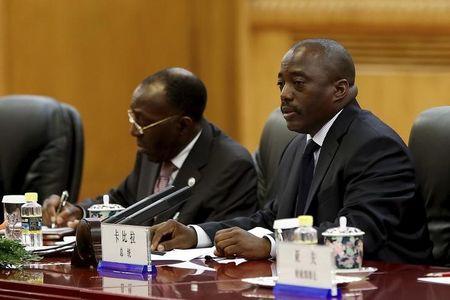Advertisement
Congo opposition protesters accuse Kabila of power grab
KINSHASA (Reuters) - More than 1,000 people demonstrated on the streets of Democratic Republic of Congo's capital on Tuesday against what they said are plans by President Joseph Kabila to cling to power after his constitutional mandate ends next year.
The crowd, which gathered in the N'djili commune of Kinshasa, waved the flags of opposition parties and banners reading "Respect for the constitution is not negotiable" and "Mr Kabila's mandate ends on December 19, 2016".
Kabila's opponents accuse him of trying to stay in office beyond the end of his second and final elected term next December. The 44-year-old president took power in 2001 when his father was assassinated and won disputed elections in 2006 and 2011.
"We need to respect the constitution," said Bienvenu Seffu, a 53-year-old school teacher and a supporter of the opposition Union for the Congolese Nation. "This is a county for all Congolese, not just one man."
The protest, which was authorised by the governor of Kinshasa, Andre Kimbuta, was peaceful. A few dozen police sat outside a nearby restaurant, watching the demonstrators.
It was the first major anti-government rally since at least 40 people were killed in protests in Kinshasa and other cities in January. They were demonstrating against a revision to the electoral code, which critics said was a pretext to delay the presidential vote. Parliament dropped the proposed amendment.
Kabila has refused to comment publicly on his political future, though a spokesman has said that he intends to respect the constitution.
Tuesday's rally was called several major opposition parties, including the Movement for the Liberation of Congo and Union for the Congolese Nation. It took place as parliament opened for its fall session.
The opposition says that a packed election calendar of more than a dozen local, provincial and national elections in the next 14 months is Kabila's latest ploy to delay the presidential vote.
The constitutional court ordered the election commission to revisit the calendar last week, saying budgetary and political constraints have made it untenable.
The largest opposition party, the Union for Democracy and Social Progress, broke off talks with representatives of Kabila on Sunday aimed at clearing the way for a national dialogue, but it did not call its supporters to the street.
Leading parties in Kabila's coalition warned him in a letter on Monday that actions by his allies had given the impression that he intends to violate the constitution by remaining in power.
They warned that violating the constitution's two-term limit risked destabilising the vast Central African country, where regional wars between 1996 and 2003 killed millions, most from hunger and disease.
"We need this Machiavellian and mafia-like band to go," said businessman Apollinaire Lubamba at the protest.



















Add new comment